Beth Tabler's Blog, page 215
October 18, 2021
On Writing by Stephen King Will Make You a Better Reader
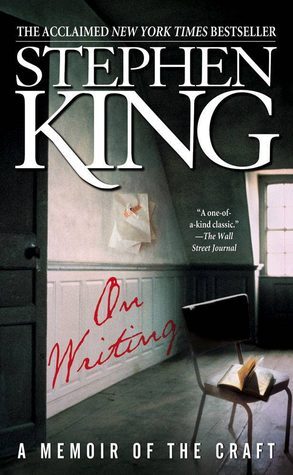 check it out here
check it out here ARTICLE
ON WRITING by STEPHEN KINGREVIEW BY COLE RUSH
October 18, 2021 10:00 am No Comments Facebook Twitter WordPress “Books are a uniquely portable magic.”Amid any Stephen King fan’s pile of books, you’re likely to encounter a small, unassuming nonfiction volume: On Writing. The meta-book sees Stephen King writing about the craft itself. It’s become an indispensable reference for writers of all sorts–aspiring, up-and-coming, and seasoned alike.
For readers, though, On Writing might stick out as a skippable stop on a Stephen King pilgrimage. Just ask my sister, who documents her journey through the King pantheon on our shared Tik Tok account, BookRush. She has no plans to read On Writing, opting instead to read King’s myriad fictional tales.
I’m not here to judge. There’s nothing wrong with preferring King’s spooky-scary-supernatural work to his nonfiction. But On Writing delivers a thorough, breezy look at the craft. Even if you aren’t a writer, you stand to gain a lot from King’s memoir/how-to hybrid. On Writing will make you a better reader.
Reality Fuels FictionOn Writing’s first half serves as a memoir. King recounts tales from his upbringing that shaped his experience as a writer. Outright instructions can’t be found here. It reads like a series of King short stories a lá Different Seasons or any of his other collections. For King fans, it provides a look at the master’s life without the lens of the supernatural. One story–my personal favorite of the bunch–involves an exposed derriere and an unfortunate mishap with poison ivy.
King’s nuggets of wisdom, though couched in his childhood memories, can shape the way you read. In these snippets, King showcases how a writer’s experience can mold a person. Through tragedy, comedy, and hardship, writers hone their craft. Whether or not they do it overtly, writers imbue their stories with experience. The sheen of fiction may obscure the message or warp it to fit the narrative at hand, but readers can better understand a work if they get glimpses–veiled by fiction or not–into a writer’s psyche.
On Writing removes the extra steps. Selective editing makes for punchier stories, but King still lays his life bare for readers in On Writing’s first chunk. When you understand the experiences that shaped King as a writer, you’ll begin to grasp how he (and other writers) can craft a character.
Hot on the heels of your On Writing journey, you’ll begin to see telltale signs of impressively written character development. For a hundred pages and some change, King welcomes you into his world, explaining how his experience formed him. And even if you’re not a writer, you can learn a lot.
Tools of the TradeEventually, King’s childhood reminiscing gives way to the juicy stuff. The craft itself. On Writing’s back half tackles King’s tips and tricks for honing your written voice and mechanics in the form of actual, tangible evidence readers can look for in a good book. Whether you’re a reviewer, a Booktoker, or just a for-fun reader, On Writing can teach you about the bones of a book. How does language function to tell a story? What triggers that knee-jerk “This is bad” response in a reader?
Turns out King’s list of dos and don’ts, codified in this book, are an exquisite barometer. On one hand, examples as simple as “avoid adverbs” serve as easy ways to measure a writer’s skill as you’re reading their book. You’ll notice I took this tip to heart and used precious few of the “-ly” monstrosities in this piece. Little mechanical flourishes don’t always make or break a book, but they can signal the reader with important messages.
a writer’s first outing overflows with clunky adverbs or similar unfortunate stylistic choices, you’ll notice it more after you read On Writing. Will you suddenly hate books you otherwise would’ve adored? No. But On Writing offers tips and tricks that are just as useful to the savvy reader as they are to writers. And if you want to add some tools to your critical reading arsenal, King has them in spades.
A larger example comes in the form of thinking outside the box. King lays out a story–one of a couple in turmoil, their relationship disintegrating into violence and fear. It’s utterly believable and feels inspired by real-life events. But then King challenges writers to reverse the dynamic of the relationship and make the victim the abuser.
Start from scratch with those roles reversed, King asks, and see where the story takes you. This exercise allows writers to explore character and to feel out the natural actions a well-honed cast member might make.
For readers, suggestions like these can work as narrative scavenger hunts. As you’re reading about your favorite protagonist, identify those moments that feel real, or at least true to the character.
It may not feel different right away. But I noticed a marked shift in how I understood characters after I read On Writing. And on the other hand, I felt a pang of regret when a character moment felt forced, or when a writer railroaded their protagonist into a choice that didn’t resonate with the development leading up to it.
For every regretful moment, however, you’ll have a glorious one. A revelation of sorts. You’ll begin to understand what drives your favorite characters, and you’ll latch onto the choice they make–good or bad–because they resonate. They hit different.
On Reading On WritingThough I’m a writer of sorts–a journalist, a book reviewer, and a pithy slack message sender (just ask my pals at TheQuillToLive; if they tell you I’m not funny they’re lying), I found joy in King’s “Memoir of the Craft” first and foremost as a voracious bookworm.
Among King’s collection of writer’s tips, you’ll find nuggets of truth that serve writers and readers alike. The lessons you learn from On Writing will follow you through every epic tale, every suspenseful mystery, and every spacefaring adventure. Armed with the tools of a prolific writer, you will evolve as a reader
Check Out some of our other reviewsReview – The Final Girl Support Group by Grady Hendrix
Review – The Body by Stephen King
Review – Pet Sematary by Stephen King
Review – The Shining by Stephen King
COLE RUSH
Cole Rush writes words. A lot of them. For the most part, you can find those words at TheQuillToLive.com. He voraciously reads epic fantasy and science-fiction, seeking out stories of gargantuan proportions and devouring them with a bookwormish fervor. His favorite books are: The Divine Cities Series by Robert Jackson Bennett, The Long Way To A Small, Angry Planet by Becky Chambers, and The House In The Cerulean Sea by TJ Klune.
Find him on Twitter: @quilltolive
Or on BookTok: https://www.tiktok.com/@bookrush?
October 17, 2021
Review – The Shining by Stephen King
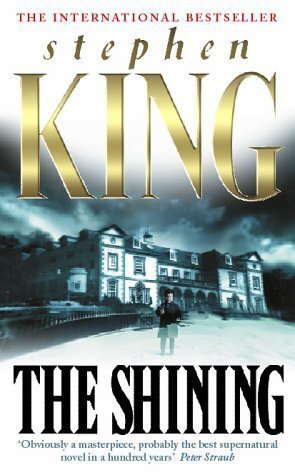 check it out here
check it out here BOOK REVIEW
THE SHINING by STEPHEN KINGREVIEW BY COLE RUSH
October 17, 2021 10:00 am One Comment Facebook Twitter WordPress “Wendy? Darling? Light, of my life. I'm not gonna hurt ya. I'm just going to bash your brains in.”How does one review a book that everyone knows about already (oops)? The Shining is so pervasive that you’d be hard-pressed to find someone who hasn’t heard of it. Cultural osmosis makes that a near certainty. Tack on the fact that most readers have settled firmly on one side of the Stephen King fence. Love him or hate him, he’s a force to be reckoned with, and The Shining proves it. I picked it up, naturally, to review it here. But I also read it for my ongoing Page2Screen series with Ian Simmons of Kicking the Seat–look out for our discussion of The Shining next week at KickSeat.com; the episode will cover both the film and book.
Mentioning the film verges on necessary in any review of The Shining, because so many people are familiar with “Heeeeeere’s JOHNNY” and the like. Stephen King’s original work is plenty present in Kubrick’s film, but as we readers know, books just hit different. This has perhaps never been more true than it is for The Shining, a hard-hitting crescendo of a book that bubbles and boils to an explosive climax. Whether or not you’ve seen Stanley Kubrick’s iconic film adaptation, The Shining is a fantastic read.
Jack Torrance, his wife Wendy, and his son Danny head to Colorado’s Overlook Hotel for the winter. Jack has been hired as the winter caretaker at the Overlook, a job he receives from a friend after he gets fired from his teaching job for, y’know, pummeling a student he kicked off the debate team. Jack’s five year old son has a knack for knowing what people are thinking, where lost things can be found, and what will happen in the future. This power–the shining–is fueled by the Overlook, where sinister things dwell in the shadows. As the Colorado winter snows them in, the Overlook begins to take its toll on the family, and Jack begins to lose his grip on sobriety and sanity.
The Shining is brilliant. It’s a masterpiece of character and a striking psychological thriller. By isolating his three main characters in a creepy locale, King opens doors into gradually degrading psyches addled by the isolation and the terrors running rampant through the Overlook. There came a point in The Shining where I blurted out “Oh, Jack’s crazy” to myself. As I read, I wondered if Jack was crazy the whole time, then I wondered whether I was crazy for not seeing how crazy he was from the get-go. Each successive chapter in The Shining dives deeper into the darkest portions of a character’s mind. Jack, Danny, and Wendy all feel intensely real in a way I’ve rarely experienced through my years-long reading career.
Movie buffs may not be surprised by this at all. But the movie eschews the psychological-thriller aspects of The Shining in favor of horror. You could argue that’s better for the screen anyway, and that’s fair. The movie has its merits, but the impact of the characters in King’s original novel is far greater than it is in the film. I came to know so much about the characters, even as King threw them into a downward mental spiral.
The Shining also features an entirely unique character: The Overlook. The hotel is essentially a character itself, constantly changing the way the Torrances think and act. It has a dark presence that reverberates through every page. As I read, at times I could feel the Overlook’s influence lurking behind every word, nudging Jack, Wendy, and Danny to do its bidding. The Overlook is pure tension. Juicy, horrific tension. It’s the embodiment of every bad thought or impulse a human could dream up. It brings these concepts to life and terrorizes the characters within it. Danny is an excellent foil to The Overlook. The hotel wants Danny’s massive power for itself, but it’s that power that gives Danny the mental capacity to resist it (plus his ability to read minds and predict the future). Danny is hunted for his powers and also protected by them, so the hotel finds the path of least resitance to acquiring him. The Overlook feeds on the weaker mind of newly sober Jack Torrance and drives him into a murderous rage in its attempts to stop Danny’s resistance (read: kill him) and absorb his power. It woos Jack, convinces him he is the one it wants, then uses him as a means to an end. The narrative arc of the Shining’s characters is dark, demented, and beautiful. It’s as much a joy to read as it is positively terrifying.
I wish I had more to offer to the conversation surrounding The Shining. Instead, I feel trapped by my own mediocrity. I know this book is excellent, and I know the characters–Overlook included–are some of the best I’ve ever read. But I can’t pinpoint every little thing that made me feel this way about the novel. Rather than a sum of its parts, The Shining is one cohesive whole that tells an amazing story. I can’t give it much higher praise than that.
Rating: The Shining – 9.5/10
-Cole
Original Review Can Be Found Here
Check Out some of our other reviewsReview – The Final Girl Support Group by Grady Hendrix
Review The Body by Stephen King
COLE RUSH
Cole Rush writes words. A lot of them. For the most part, you can find those words at TheQuillToLive.com. He voraciously reads epic fantasy and science-fiction, seeking out stories of gargantuan proportions and devouring them with a bookwormish fervor. His favorite books are: The Divine Cities Series by Robert Jackson Bennett, The Long Way To A Small, Angry Planet by Becky Chambers, and The House In The Cerulean Sea by TJ Klune.
Find him on Twitter: @quilltolive
Or on BookTok: https://www.tiktok.com/@bookrush?
October 16, 2021
Review – Pet Sematary by Stephen King
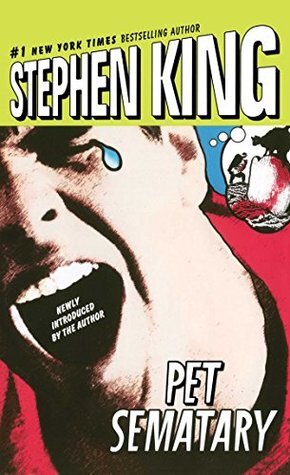 check it out here
check it out here BOOK REVIEW
PET SEMATARY by STEPHEN KINGREVIEW BY COLE RUSH
October 16, 2021 10:00 am No Comments Facebook Twitter WordPress “Sometimes dead is better”Stephen King’s Pet Sematary plunges readers into a deep well of terror that provides a steady supply of eerie atmosphere, horrifying happenings, and a look into their effect on human relationships. The novel wrestles with death, grief, and human nature, bleeding dark themes onto every page. Pet Sematary transformed me from a hesitant first-time King reader to a horror rookie who can appreciate the power of scares and omnipresent creep-factor. Over the course of the book’s ~400 pages, I eagerly read from chapter to chapter hoping to learn something new about the characters, the small town Northeastern United States setting, and the mysterious goings-on that drive the story to an incredibly satisfying end.
Protagonist Louis Creed moves his family from Chicago to Ludlow, Maine on the heels of a job offer at a nearby university’s medical center. On the day of their move, Louis, his wife Rachel, and children Ellie (5) and Gage (2) meet their neighbor Jud Crandall. Jud’s lived in Ludlow his entire life, and he strikes a friendly, pseudo-father-son relationship with Louis. The two drink beers on Jud’s porch and shoot the breeze almost nightly, and Jud eventually brings Louis and his family to the eponymous Pet Sematary, a graveyard kept (and spelled, notably) by children for the pets they’ve lost, many of which were killed by trucks speeding down the main road where Louis and Jud reside. It’s after this incident that Pet Sematary reaches a boiling point that only rarely cools to a simmer. Rachel is visibly shaken by the place while Ellie is intrigued and starts asking questions about death. An accident at Louis’ medical office kickstarts a series of events that intertwines his life with the Pet Sematary and turns the creepiness up to max volume. Turns out Native American burial grounds don’t take kindly to being trifled with–but that’s all I can say before giving away the book’s juiciest and scariest moments.
“And the most terrifying question of all may be just how much horror the human mind can stand and still maintain a wakeful, staring, unrelenting sanity.”
King’s shining prose won me over almost immediately, cementing Pet Sematary as a quality reading experience. He condenses lofty ideas into short, digestible sentences. He keeps the reader interested with effortless descriptions of Louis’ train of thought. He introduces supernatural elements so smoothly that they feel tangible. It feels dumb even typing this about an author who’s written more than 50 novels, but it’s true. Every paragraph serves a purpose, whether it’s exploring a motif or driving the story forward at a breakneck pace–there’s nothing missing here, nor is there any excess fat. King weaves his tale with Goldilocks-zone accuracy: it’s juuuuust right.
That paragon prose empowers King and his story to present vivid imagery and starkly accurate portrayals of family life, friendships, grief, death, and sanity (or lack thereof). Pet Sematary, told through the lens of Louis Creed’s psyche, offers a darkly radiant panorama of addled minds and the power of death over the human brain. As the nefarious events of the novel unfold, each character deals with them in ways that feel undeniably true to form. When death pops up around a corner, Ellie, a child, grows curious. Rachel remembers the traumatic death of her sister. Louis and Jud tell each other stories and do their best to keep one another afloat in grief-stricken waters. Every relationship and conversation in Pet Sematary rings with authenticity; never once did I feel disconnected from the novel due to a stray cheesy line or over-the-top description. Just as he does with his prose for readers, King gives his characters exactly what they need to keep the story compelling.
All that said, I thought Pet Sematary’s single shortcoming was the protagonist himself. Louis Creed is a Doctor who has a new job, a loving wife (sure, they fight once in a while), two kids, and a friend in Jud Crandall. But he’s the shallowest of the cast, to the point where it becomes easy to read Pet Sematary as a self-insert novel, the main character becoming a link between the reader and the world. Some may prefer this approach, but I wanted a multi-faceted Louis over the one-dimensional conduit who lends his senses to readers on their Pet Sematary journey. Still, this is a matter of preference, and despite my misgivings, I breezed through the book.
Perhaps the most remarkable thing about Pet Sematary for me was that I enjoyed it so much even without overwhelming supernatural or fantasy elements. Don’t get me wrong–they’re plentiful. But instead of a horror onslaught, King gives readers a steady drip of scares that builds to a steady stream. By the novel’s conclusion, readers are subjected to a terrifying deluge of scares and unsettling imagery. They’re effective moments, but their impact is multiplied tenfold by King’s restraint. Once again, he gives us exactly what we need–no more, no less.
“The soil of a man’s heart is stonier; a man grows what he can and tends it.”
I read the last words of Pet Sematary and noted a distinct connection to one of the book’s earlier moments. The novel’s final moments are as powerful as those that built to it, and Pet Sematary is punctuated by a deftly written conclusion that left me rattled, with an intense and newfound appreciation for the King of Horror.
Rating: Pet Sematary – 9.0/10
-Cole
Review – The Final Girl Support Group by Grady Hendrix
Review The Body by Stephen King
COLE RUSH
Cole Rush writes words. A lot of them. For the most part, you can find those words at TheQuillToLive.com. He voraciously reads epic fantasy and science-fiction, seeking out stories of gargantuan proportions and devouring them with a bookwormish fervor. His favorite books are: The Divine Cities Series by Robert Jackson Bennett, The Long Way To A Small, Angry Planet by Becky Chambers, and The House In The Cerulean Sea by TJ Klune.
Find him on Twitter: @quilltolive
Or on BookTok: https://www.tiktok.com/@bookrush?
SPFBO7 Review and Cuts – Fableman by Brad Carsten, Elijah by S. A. Haycock, and The Mistkeeper’s Apprentice by E.S. Barrison
 By Eleni A.E.
By Eleni A.E. 
Hello dear reader, today is my turn to present my lot of SPFBO reviews for our lovely blog. In this case unfortunately I decided on cutting all three of my allotted reads because overall I didn’t think they had what it takes to continue on in the contest. Plot wise however, I do believe they all have their merits and could have elements that appeal to others even though they did not appeal to me personally.
Elijah by S. A. Haycock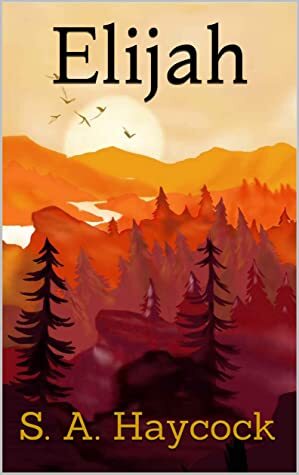 Elijah S.A. Haycock Buy A Copy Here What is it about?
Elijah S.A. Haycock Buy A Copy Here What is it about? Sixteen-year-old Jacob Da Nesta and his older sister Maria live a simple life of anonymity in their peaceful border town. But when a runaway prince from a rival nation appears in their doorway asking for them, their lives are changed forever.
Jacob, Maria, and their allies must flee from enemies both foreign and domestic as they journey through the perilous, war-torn land of Valouria. Guided only by visions from the mysterious Elijah, will Jacob and Maria reach salvation, or will their dark secrets catch up with them?
The plot blurb is intriguing, and it calls back to some classic fantasy tropes, with common folk characters being called to action by a prince in danger. The story feels fast paced from the get-go and the main point of view protagonist seems likeable enough of a narrator to follow along.
Now for the buts: The plot blurb says that siblings Jacob and Maria Da Nesta live a simple life of anonymity in their peaceful border town. Something which is disputed right from the start of the story were the two siblings are said to be tournament champions with lots of fans, with their father being the leader of the village, and hence having to watch how they behave so that they don’t get a bad rep. So that was a little bit of a confusing start.
Then, this book is written in first person present tense, which personally is my least favorite kind of narration if I am totally honest. The main reason being it is very hard to nail. In this case it was a miss though, as the author seems to be in a hurry to get into the plot so he moves past a lot of the necessary fodder and fleshing out that would give the world building and characterization any considerable depth. The characters felt really flat as a result and, at least in the percentage of the book that I read, there was barely anything for any of the protags to make them memorable for more than a few days.
Which leads me to the last pitfall. This work could’ve benefitted from more editing, as there were several instances were the narration changed from present tense to past accidentally, while at the same time having the previously mentioned jumping ahead, making for a bit of a jarring and bumpy ride through.
Ultimately, I think that this story has promise but it definitely needs more editing and perhaps a different narrator tense in order to do it justice.
Fableman by Brad Carsten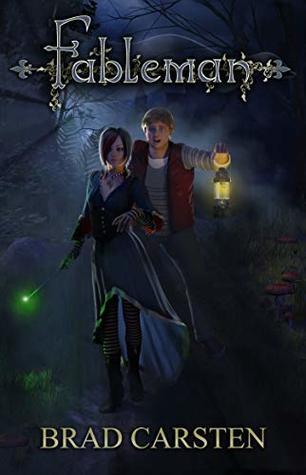 FABLEMAN By Brad Carsten Buy A Copy Here What is it about?
FABLEMAN By Brad Carsten Buy A Copy Here What is it about? People say, if Charlie Pratt had a penny for every blunder, he’d fill his pockets and then misplace his trousers.
In October the Campton river clears, and the levels drop offering a perfect excuse to get out in the crisp morning air and scour the rocks for snagged hooks and toads. It’s about as close as Charlie has come to magic… until he meets the strange but beautiful Dalia Addair.
While trying to learn more about her, he unwittingly slots himself into her magical trial—a trial she’s spent her whole life preparing for. He gets a day.
But something’s wrong; the trial holds its own secrets, and powerful forces will do whatever it takes to stop them.
The only way to survive is to finish the trials and block the way forever.
But first, Charlie and Dalia have to learn to work together—if they don’t strangle each other first.
Quirky, fast-paced, and brimming with humour and charm, Fableman is a young adult fantasy that shows how even the most unlikely hero will step forward to do what it takes—when there’s a ten-foot troll on his ass
This was an actually fun read and once you get past the first couple of chapters that take a while to warm up, and the magic starts creeping through, it was very reminiscent of works like The Spiderwick Chronicles! Charlie is a reluctant hero protagonist that is suddenly thrust into the middle of a magic trial by accident and there’s a lot of promise for several entertaining misadventures to come. The writing flows and the narrative voice is light and amusing.
All of that said, this novel really felt like a YA fantasy and hence not really fitting the criteria of the contest, which is for adult fantasy, which is ultimately why I decided to cut it from the running. I will eventually continue reading it however because it was good fun and what I would enjoy when in the mood for a low effort read.
I definitely want to see how Charlie will continue to deal with it all for sure!
The Mistkeeper’s Apprentice by E.S. Barrison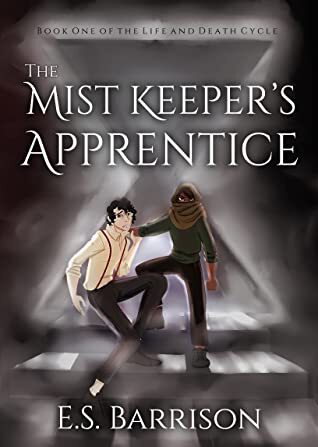 THE MIST KEEPER'S APPRENTICE by E.S. Barrison Buy A Copy Here What is it about?
THE MIST KEEPER'S APPRENTICE by E.S. Barrison Buy A Copy Here What is it about? Storytelling was outlawed. Magic had all but vanished.
That all changed when the woman in black came to town.
Branded with the black stamp at a young age, Brent thought he would end up a vagrant like his father. His craft was telling stories, but the Order had long forbidden any weaving of tales. When Brent sees the woman in black, she leads him into a menagerie of tunnels beneath the earth where his life falls into the nauseating, but beautiful, mist of the dead.
He finds friendship in Rho, a young woman who hides her face with a tree branch while roots and vines bow to her every whim. Together, they embark on a journey to explore the world, escape the watchful eyes of the Order, and discover the woman in black’s secrets.
For thousands of years, the mist and the tunnels were under the sole guardianship of the Council of Mist Keepers. But as new monsters enter the mist, and magic is forced out of the shadows, the Council searches for young blood to join their ranks and Brent’s next in line.
Eleni's ReviewThis was another instance of a book that had a promising premise and plot but could have used more editing. There were several moments where I found myself having to go back and read a passage again thinking that I’d missed some detail or other, which overall gave me the sense of the author having all of their ducks in a row in their head but forgetting a few of them along the way when putting it to paper. Past that though, the story unfolds at a slow but steady pace with some intriguing hints sprinkled in that promise an interesting payoff to come hopefully, along with Rho and Brent who seemed to have good potential for protagonists you want to root for.
Check Out SOME OF OUR OTHER REVIEWS#SPFBO Review and Cut – The Deathless One by Niranjan K.
#SPFBO Review and Cut – The Hand of Fire by Roland O’Leary
If You Liked This - Please Share the Love Eleni A.E.
Eleni is a Greek book nerd who grew up in Italy, and got her BA Honours degree in Literature from a Scottish university! She can be found reading all the SFF she can get her hands on, and reviewing it for fun when inspiration strikes and she just needs to share her passion. Alternatively, she will definitely be with a needy Westie in her arms watching series, anime, or movies. You can find her other writing on https://fanfiaddict.com or on her personal blog where there are also posts about other literary genres. Feel free to follow her day to day ramblings on Twitter
@eleni_argyroor Instagram @the_words_we_read .
October 15, 2021
Review – The Body by Stephen King
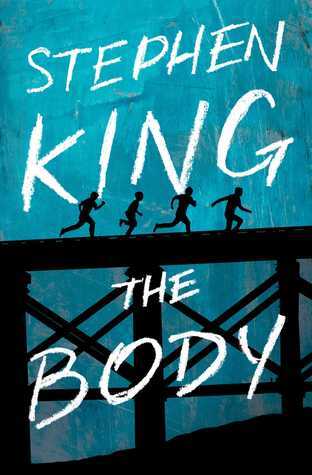 check it out here
check it out here BOOK REVIEW
The BODY by STEPHEN KINGREVIEW BY COLE RUSH
October 15, 2021 10:00 am No Comments Facebook Twitter WordPressLooking back on my childhood summers feels like gazing through a thin, glistening veil. The sheen washes away the less desirable moments–scrapes, tears, time-outs–and shows me an idyllic scene that, in retrospect, probably contains a portion of truth and a smidgen of selective memory. Step through the veil, and some of the negatives cascade into the memories. Local “big kids” lording their size over my small faction of friends. Minor disputes ending in a measly excuse for a fistfight. The fear of consequences should an adult find out about the tomfoolery we were up to. Stephen King’s The Body captures both sides of the veil with equal reverence. The novella recounts a childhood summer through the memories of one who experienced them, now a full-time writer. At once, The Body is a delightful and harrowing experience.
Gordie and his pals–Vern, Teddy, and Chris–spend their days playing cards in their treehouse and gallivanting around their northeastern US hometown. In the 60s, anything goes, and the boys often wander for a full day before returning home. When Vern catches his older brother recounting his discovery of a dead boy near the train tracks (and his reticence to report it because they found it after boosting a car), the foursome immediately formulates a plan to seek out the body some 30 miles from their homes. Once they get the logistics in place, the boys set out on their journey, bonding over shared experiences and generally enjoying a reckless childhood summer together in the sweltering September heat.
The Body is (surprise!) barely about the eponymous deceased child, other than perhaps a symbolic reading about the death of childhood. Instead, the story recounts summer days spent in the company of young friends whose biggest worries are steering clear of the brash older kids and dodging parental punishment for their antics. In this way, The Body reminds me of the films Now & Then and The Sandlot, the former of which is (hot take) far superior. King captures the magic of those summer adventures with prose that transports the reader to a simpler time.
“Simpler time,” of course, can also mean a less tolerant era. Readers will encounter racist, sexist, and homophobic slurs throughout, emblematic of the 1960s setting. An important note for those looking to read this story.
Where The Body really shines, outside of its prose, is in character. In the space of ~180 pages, King makes you care about these kids. Their excursion into the landscape surrounding their homes allows them space to breathe, and you learn so much about kids who should by all means just be allowed to enjoy a carefree, school-free stretch of summer. But life isn’t always kind and carefree, and Gordie’s cadre knows this all too well. They can be brash, dumb, and narrow-sighted as kids often are, but their pasts–even at a paltry 12 years old–paints a broader picture of abuse, neglect, and grief. Their search for the body, their trek across an active railroad bridge, their night spent in the wilderness–it all takes on new meaning when you understand each character’s story. This, for them, is family. And it’s ephemeral. Gordie tells of how they grow apart as life trudges forward, but he still holds the memories dear. For me, The Body reads as a commentary on the transience of friendships, and how a relationship that fades can still be transformational in its lasting impact. Sometimes people leave us, whether on purpose or over the natural course of life, and it’s okay to let them go.
Whether you like The Body will inevitably be a result of your own mindset and past. It isn’t a classic King horror. It’s a “the monsters are actually people” book. Or perhaps a “we make our own monsters” book. I loved it, both for the refreshing nod that the veil of childhood is a powerful thing, and for the reminder that endings can be as impactful as the stories that spark them.
Rating: The Body – 9.0/10
Check Out some of our other reviewsReview – The Final Girl Support Group by Grady Hendrix
COLE RUSH
Cole Rush writes words. A lot of them. For the most part, you can find those words at TheQuillToLive.com. He voraciously reads epic fantasy and science-fiction, seeking out stories of gargantuan proportions and devouring them with a bookwormish fervor. His favorite books are: The Divine Cities Series by Robert Jackson Bennett, The Long Way To A Small, Angry Planet by Becky Chambers, and The House In The Cerulean Sea by TJ Klune.
Find him on Twitter: @quilltolive
Or on BookTok: https://www.tiktok.com/@bookrush?
September 29, 2021
Male Authors Writing Women
Hello Dear Reader or Listener,
Did my title pique your curiosity as to the next list of epic eye roll causing, facepalm inducing, I-cannot-believe-someone-thought-this-was-ok-to-publish snippets?
If the answer is yes, I get it. I’m partial to perusing those lists on occasion myself. I enjoy a good laugh even if I then have to chase my eyes that are still rolling off somewhere in the distance.
If anything, I’m almost disappointed sometimes when I read them, only to find out my own body doesn’t have the sort of mood ring reactions as some authors think women’s bodies do. (Let’s just roll with the structure of that sentence, please).
It’s definitely become a bit of a running gag or meme to comment on the abysmal takes on women written by some men, and while, as I said, I do amuse myself with these kinds of Twitter threads or posts on whichever social medium of your choice, I have to admit they also tire me. The causes can be many, but frankly, I’m not here for them.
This isn’t a feminist rant on the fallacies of the patriarchy or the blatant shows of ignorance and prejudice. Not even gonna mention fantasy fulfillment stuff. All topics which people far more well-read on them than me have weighed in on, and are rather good reads.
Also, anyone who knows me knows already that I hate, no, loathe, pointlessly leery male gaze heavy texts. So I’m not here to tackle such a discourse because it’s not very useful other than for finding authors to avoid and/or block. Nor do I advocate for finding people to trash or attack.
So what are we here for then? Well, the title is pretty self-explanatory, but rather than the usual, and varying degrees of amusing or bewildering, bad examples, this is a bit of a spotlight post on male authors I’ve enjoyed reading, who can shine as great examples of writing female characters like the freaking normal and multifaceted humans that we are. (Again, let’s roll with the pretense that I can be counted among the normal ones, please). We are here for positivity, people!! And, the way I see it, a list of bad examples brings, at worst, scorn and anger, at best some laughter, whereas a list of good examples can bring fun, inspiration, and satisfaction.
(Sidenote for the maliciously inclined, cause I sadly know you’re out there, this isn’t meant as a condescending “look at you, even your little mind did it!” kind of text. I don’t roll like that.)
So then, good female representation, just like any sort of rep really, is something that I greatly appreciate finding even when not actively looking for it. To make things even better, I think adult SFF is doing wonders in being better and better at it in recent years. Moreover, it’s always heartwarming to see oneself reflected in some way in a character that you’re growing to admire and love as you read. It feels like you’re being understood a little more, and it’s one of my favorite things to go through when reading. It doesn’t even always have to be a case of relating to the characters either though! It can also be instances of recognizing the genuine and natural behavior of a character, which in turn, helps you as a person to relate more to others and understand them better in real life!
Reading is an exercise in empathy, in my opinion, but that’s for another time to ramble on.
So then, it’s not a question of knowing how to write a female character specifically, but rather one of “does this author show his skill at writing all kinds of characters in all genders without fetishizing them in some way or falling into stereotypes”? The versatile ones do. That’s all there is to it.
For some disclaimers then: this list isn’t all that long, not because I haven’t found authors that can write women, but because firstly, it’s only a limited list with authors whose main point of view protagonists are women. This will inevitably leave out several amazing authors who do write female characters wonderfully, but they’re side characters in their stories. Secondly, it’s based on those that I’ve read in most recent years.
And lastly, this list is so short because, if this is something that people like, I would happily make it a repeat thing in the future, with more entries that others can contribute to as well!
So for my first three choices for Male Authors Writing Women:Garth Nix: The Old Kingdom series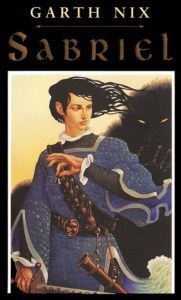 Sabriel was the very first heroine I read as a teen that I utterly looked up to and admired. I saw her as someone I could become growing up and, together with Lirael in the later books of the series, they were some of the best early rep of kick-ass young women who had their weaknesses and insecurities but learned to navigate them, if not even overcome them to some extent.
Sabriel was the very first heroine I read as a teen that I utterly looked up to and admired. I saw her as someone I could become growing up and, together with Lirael in the later books of the series, they were some of the best early rep of kick-ass young women who had their weaknesses and insecurities but learned to navigate them, if not even overcome them to some extent.
Marca Nbaro is my most recent favorite character and I love her dearly. Her inner dialogue is rich and genuine. Her interactions with other female characters are as natural as can be and especially relatable for the socially aware among us. She struggles with social cues and has to learn what it’s like to be part of a crew, as well as how to navigate interpersonal relationships. And it’s all so wonderfully natural and simple in its complexity.
Django Wexler: The Shadow CampaignsThis is one of my top favorite series of all time and one of the many, many, reasons why is the amount of incredible women in it! Of these, only two are main points of view and those are Winter and, from book 2 onward, Raesinia. These two are some of the most natural and realistic women in adult fantasy literature that I’ve ever read. They fight against prejudices, let themselves lean into their personal melodrama upon occasion, or enjoy the unintentional hilarity of dark but absurd situations.
These women have lots in common, they are brave, loyal, smart, and inventive, but they are also struggling to overcome past aches or wounds. They have no-nonsense attitudes but also weaknesses that they don’t miraculously set aside, but rather find ways to fight through them so that they may also heal to some extent if not entirely. They also make an effort to ensure that those around them aren’t as alone as they have felt first hand. They make the best of their situations and, most often with a healthy side of sarcasm and swearing, they find solutions. In fact, in having to deal with an awful lot of responsibility and struggles, they do so in ways that remind me of any time I or a friend has made light of a bad situation cause what is the point whining? Might as well get to it best you can.
I don’t know about you, dear reader/listener, but these look like some amazing examples to me. Both for the literary prowess of these first three authors, and as characters I’d like to be more like!
As always, if you have any suggestions that I should look into to further add to this list then go on ahead and comment below or on Twitter! Same goes if you want to see more of these suggestions, let me know!
Until next time,
Eleni A. E.
Check Out Some of Our Other Articles:
September 28, 2021
Author Interview – Bjorn Larssen, Author of Children
 Bjorn Larssen "...I was always going to write about the Norse Gods – I’m a heathen myself. But there are so many straight retellings, maaaaybe with a spin. I wanted to tell the stories from the point of view of Thor’s neglected son and Freya’s “adopted” daughter – Thor’s son, Magni, gets two mentions in the entire lore, the second being that after Ragnarök he carries Thor’s hammer back into Ásgard.. ...."
Bjorn Larssen "...I was always going to write about the Norse Gods – I’m a heathen myself. But there are so many straight retellings, maaaaybe with a spin. I wanted to tell the stories from the point of view of Thor’s neglected son and Freya’s “adopted” daughter – Thor’s son, Magni, gets two mentions in the entire lore, the second being that after Ragnarök he carries Thor’s hammer back into Ásgard.. ...." Six Elementals Author Interviews will introduce prospective readers to some of the best writers in their genre you may, or may not, have heard off, via a series of six questions. I encourage you to check out the work of these phenomenal creatives! Links to their websites and purchase links will always appear, accompanying the interview. Check them out!
I am very humbled to be joined by the incredible Bjorn Larssen, author of historical fiction, and Grimdark Norse fantasy. Bjorn’s current published works are: Storytellers, Children, and Creation.
P.L.: Thank you so much Bjørn for participating in this interview. Is there anything in particular you would like readers to know the author and person who is Bjørn Larssen?
Check Out the Original Post Here
Bjorn: Thanks so much for having me! I’m the sort of person who completely blanks when facing an open question like this. Um. I’ve got a degree in maths, I worked as a blacksmith for four years, and having your head tattooed isn’t very painful, but BRING EARPLUGS.
P.L.: Ha ha! I’m not brave enough like you to even attempt smithing! You are quite the decorated author at an early stage in your career. Your first book, Storytellers has won a Readers’ Favourite Gold Medal, been a Discovering Diamonds’ Discovered Diamond Winner, and an Eric Hoffer Grand Prize Award Finalist. Your second book, Children is a Stabby Nominee, and has placed second in the Cover Contest for Self-Published Fantasy Blog Off #7. You have recently published your third book, the novella Creation, which is already receiving rave reviews. How do you feel about all the accolades and success you have enjoyed so far?
Bjorn: I keep waiting for people to realise they’ve been reading the wrong books all this time. (I’m definitely very proud of the covers. Those are right.) Seriously, though, I don’t know. I don’t think of myself as “oooh, I’m such a decorated author”  That gold medal helps with the impostor syndrome a lot. My husband hung it so that I can always see it from my usual writing spot when I get into the “I’m shit at this” mindset.
That gold medal helps with the impostor syndrome a lot. My husband hung it so that I can always see it from my usual writing spot when I get into the “I’m shit at this” mindset.
P.L.: I think that was a wonderful idea by your husband to help stave off thoughts of “imposter syndrome” we creatives suffer from time to time. There are lots of ongoing discussions regarding neurodivergent writing in fantasy and other fiction genres. You wrote quite the compelling article yourself on the subject, as have many top and emerging authors. How would you assess the current state of neurodivergent writing in fantasy?
Bjorn: I hope it doesn’t become a part of the “diversity checklist” – the traditional publishing has been very enamoured with the concept of diversity, because it turned out that there’s money to be found there. “This book contains good representation of bipolar disorder” kind of thing. What appeals to me is the idea of a character with bipolar, or an autistic one just being in the book. Without a diagnosis or medication, just as a person.
Flóki from the TV show Vikings would most probably get diagnosed with schizoaffective disorder today. I think that was the first time I saw an ND character like this on TV, and not advertised the way Homeland was – “PAY ATTENTION: CLAIRE HAS BIPOLAR.” Flóki just was who he was. It wasn’t his Horrible Burden, it wasn’t his Great Superpower, nobody pointed at him hissing “it’s the crazy one.” Ragnar was Ragnar, Lagertha was Lagertha, Flóki was Flóki. This is how I would like to write and what I would like to read. Characters who don’t have to get “fixed,” are not “diverse,” and are more complex than “the crazy one” – but you get to learn from them and about them.
P.L.: I love your perspective, and how “just being” part of the book and learning from the characters what they are all about, through their own words teaches the reader about neurodivergence. Your brilliant book Children is unforgettable, and one of my favourite all time reads. It is also very haunting and some might even say disturbing. What was the impetus to write that particular book, including some of the dark themes explored?
Bjorn: Thank you!
I was always going to write about the Norse Gods – I’m a heathen myself. But there are so many straight retellings, maaaaybe with a spin. I wanted to tell the stories from the point of view of Thor’s neglected son and Freya’s “adopted” daughter – Thor’s son, Magni, gets two mentions in the entire lore, the second being that after Ragnarök he carries Thor’s hammer back into Ásgard.
The mythology as a whole – well, what we have left – is incoherent. Some myths are contradictory. I wanted to put them in an order that would make some sense, using Magni and Maya as the main actors. Accidentally I ended up writing this grimdark novel that reconstructs three or four myths, has the pantheon in it, and lots of my personal experiences. I was very surprised to hear that people felt the book was so dark; I knew two scenes, one of them based on my experience, were really dark, but I thought the rest was sort of…average. I thought that since there was no bloodshed, the book was kinda light and funny, right?
P.L.: It seems “grimdark” has become associated with graphic violence, yet sometimes the psychological aspect is forgotten when we think about that type of writing. What types of books does Bjørn Larssen like to read? Please name some authors you will pretty well read anything they write?
Bjorn: I read very wide. Jenny Lawson, Allie Brosh, Karen Heenan, Marian Keyes, Marian L. Thorpe, Krystle Matar, Michael Cunningham, Samantha Irby, Annie Whitehead are auto-buys for me. There’s the old guard, of course, as well – Jane Austen, Brontë sisters, Carrie Fisher, Judith Krantz, Julio Cortázar, Sir Terry Pratchett. I don’t read horror and I don’t like slashers – I stay away from the sort of fantasy that uses the word “bloodshed” in the blurb. And, this is quite specific, nothing about World War II or that period, unless it’s set somewhere the war didn’t reach and it’s never mentioned. That’s a personal thing.
P.L.: Those are some phenomenal authors you list! Some of them are traditionally published, some self-published. You are a self-published author. Does the world of traditional publishing tempt you? Would you ever be traditionally published?
Bjorn: Technically the Storytellers audiobook is traditionally published, but I had complete control over every aspect, from the narrator choice to the cover. The text is unabridged. This is how I would be happy to get traditionally published: don’t touch my book, just give me money. In other words, I’m never going to have a legacy publisher, unless it’s for translation rights. I have never received a rejection from an agent or a publisher, because I never sought one – I knew a year before I finished Storytellers that I would be publishing it myself.
Thanks again for having me! It’s been a pleasure.
P.L.: It has been so awesome to speak to you, Bjorn, thank you!
Bjørn Larssen is a Norse heathen made in Poland, but mostly located in a Dutch suburb, except for his heart which he lost in Iceland. Born in 1977, he self-published his first graphic novel at the age of seven in a limited edition of one, following this achievement several decades later with his first book containing multiple sentences and winning awards he didn’t design himself. His writing is described as ‘dark’ and ‘literary’, but he remains incapable of taking anything seriously for more than 60 seconds.
Bjørn has a degree in mathematics and has worked as a graphic designer, a model, a bartender, and a blacksmith (not all at the same time). His hobbies include sitting by open fires, dressing like an extra from Vikings, installing operating systems, and dreaming about living in a log cabin in the north of Iceland. He owns one (1) husband and is owned by one (1) neighbourhood cat.
www.bjornlarssen.com
www.twitter.com/bjornlarssen
www.facebook.com/bjornlarssenwriter
www.instagram.com/bjorn_larssen
https://www.goodreads.com/author/show/18916648.Bj_rn_Larssen
Bjørn Larssen – writer, blacksmith, spiritual Icelander Blog
Buy His Books Here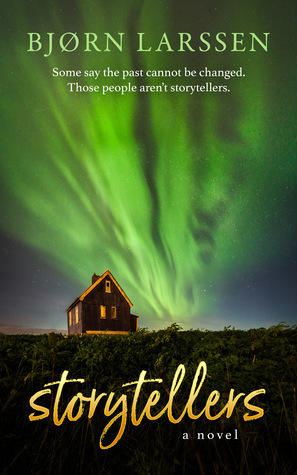
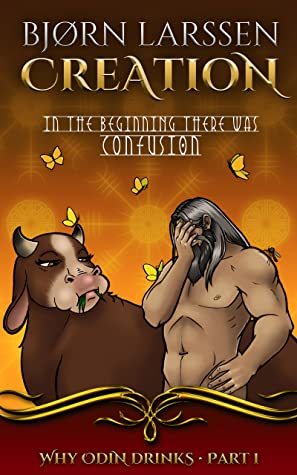
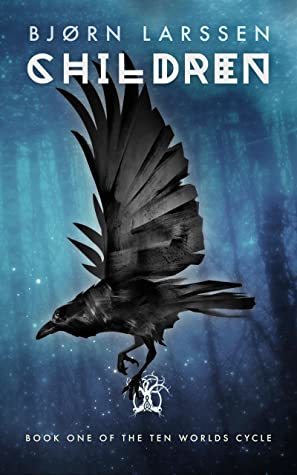 Check Out Some Of Our Other interviews
Check Out Some Of Our Other interviews Interview; Kristyn Merbeth Author of the Nova Vita Protocol
Interview; Author Grady Hendrix
Interview – Author Jason “David Wong” Pargin
P.L. Stuart
I’m an experienced writer, in that I’ve been writing stories all my life, yet never thought to publish them. I’ve written informally – short stories – to entertain friends and family, for community newspapers, volunteer organization magazines, and of course formal papers for University. Now, later in life, I’ve published what I believe is a great fantasy novel, and definitely worth reading, called A Drowned Kingdom. My target audience is those who enjoy “high fantasy”. A Drowned Kingdom is not “dark fantasy”. It’s written in a more idealized and grandiose style that I hope isn’t too preachy, and not too grim. Still, I’m hoping my book has appeal to those who don’t typically read this type of work – those who don’t read fantasy of any kind – because of the “every-person” themes permeating the novel: dysfunctional familial relationships, extramarital temptation, racism, misogyny, catastrophic loss, religion, crisis of faith, elitism, self-confidence, PTSD, and more.
Many of these themes I have either personal experience with, or have friends or family who have dealt with such issues. I’ve had a long professional law enforcement career, undergone traumatic events, yet been buoyed by family, faith, and positivity. I’m a racialized middle-aged man. I’ve seen a lot of life. Ultimately I want the planned series, of which A Drowned Kingdom will be the introduction, to be one of hope, and overcoming obstacles to succeed, which I believe is my story as well. My protagonist, Othrun, will undergo a journey where he’ll evolve, change, and shape a continent. He’s not always likeable. He’s a snob, bigot, is vain, yet struggles with confidence. He’s patriarchal. Overall, he’s flawed. But even ordinary flawed people can change. We’re all redeemable.
Ordinary people can make a difference, not just fictional Princes. I want that message to shine through my work.
WHERE TO FIND HIMTwitter – @plstuartwrites
Facebook – @plstuartwrites
If You Liked This - Please Share the LoveFirst Chapter, First Paragraph – Lord of the Flies by William Golding
 What it is About?
What it is About? 
At the dawn of the next world war, a plane crashes on an uncharted island, stranding a group of schoolboys. At first, with no adult supervision, their freedom is something to celebrate; this far from civilization the boys can do anything they want.
Anything. They attempt to forge their own society, failing, however, in the face of terror, sin and evil. And as order collapses, as strange howls echo in the night, as terror begins its reign, the hope of adventure seems as far from reality as the hope of being rescued. Labeled a parable, an allegory, a myth, a morality tale, a parody, a political treatise, even a vision of the apocalypse, Lord of the Flies is perhaps our most memorable novel about “the end of innocence, the darkness of man’s heart.”
First Chapter, First ParagraphCheck Out Our Other First Chapter, First Paragraph
The boy with fair hair lowered himself down the last few feet of rock and began to pick his way toward the lagoon. Though he had taken off his school sweater and trailed it now from one hand, his grey shirt stuck to him and his hair was plastered to his forehead. All round him the long scar smashed into the jungle was a bath of heat.
He was clambering heavily among the creepers and broken trunks when a bird, a vision of red and yellow, flashed upwards with a witch-like cry; and this cry was echoed by another.
“Hi!” it said. “Wait a minute!”
The undergrowth at the side of the scar was shaken and a multitude of raindrops fell pattering.
“Wait a minute,” the voice said. “I got caught up.”
The fair boy stopped and jerked his stockings with an automatic gesture that made the jungle seem for a moment like the Home Counties.
The voice spoke again.
“I can’t hardly move with all these creeper things.”
The owner of the voice came backing out of the undergrowth so that twigs scratched on a greasy wind-breaker. The naked crooks of his knees were plump, caught and scratched by thorns. He bent down, removed the thorns carefully, and turned around. He was shorter than the fair boy and very fat. He came forward, searching out safe lodgments for his feet, and then looked up through thick spectacles.
“Where’s the man with the megaphone?”
The fair boy shook his head.
“This is an island. At least I think it’s an island. That’s a reef out in the sea. Perhaps there aren’t any grownups anywhere.”
The fat boy looked startled.
“There was that pilot. But he wasn’t in the passenger cabin, he was up in front.”
First Chapter, First Paragraph – The White-Throated Transmigrant by E. Lily Yu
First Chapter, First Paragraph – Three Parts Dead by Max Gladstone
First Chapter, First Paragraph – Catch 22 by Joseph Heller
Why You Should Check This Out...This is one of those books that as I got older, I became more aware of how messed up some of the themes are and how good the writing is. I think it is one of those books that you could read every decade of your life and get different things from it. I think I will reread it again in a few years when I am surrounded by puppies and kittens and everything is grand.
This book is harsh. You may like it. You may hate it. Honestly, it is a book that will affect you in some way. I first read it in high school and have carried it with me since then. It illustrates the dark side of humanity, in what should be the least dark part of humans, kids.
September 27, 2021
Review – Stitches by David Small
 A Story of The Muted
A Story of The Muted  Beth Tabler 5/5
Beth Tabler 5/5 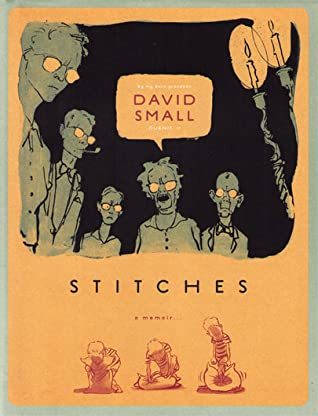 Stitches by David Small Purchase Here
Stitches by David Small Purchase Here David Small, Stitches About“ When you have no voice, you don’t exist”―
One day David Small awoke from a supposedly harmless operation to discover that he had been transformed into a virtual mute. A vocal cord removed, his throat slashed and stitched together like a bloody boot, the fourteen-year-old boy had not been told that he had cancer and was expected to die.
In Stitches, Small, the award-winning children’s illustrator and author, re-creates this terrifying event in a life story that might have been imagined by Kafka. As the images painfully tumble out, one by one, we gain a ringside seat at a gothic family drama where David—a highly anxious yet supremely talented child—all too often became the unwitting object of his parents’ buried frustration and rage.
Believing that they were trying to do their best, David’s parents did just the reverse. Edward Small, a Detroit physician, who vented his own anger by hitting a punching bag, was convinced that he could cure his young son’s respiratory problems with heavy doses of radiation, possibly causing David’s cancer. Elizabeth, David’s mother, tyrannically stingy and excessively scolding, ran the Small household under a cone of silence where emotions, especially her own, were hidden.
Depicting this coming-of-age story with dazzling, kaleidoscopic images that turn nightmare into fairy tale, Small tells us of his journey from sickly child to cancer patient, to the troubled teen whose risky decision to run away from home at sixteen—with nothing more than the dream of becoming an artist—will resonate as the ultimate survival statemen



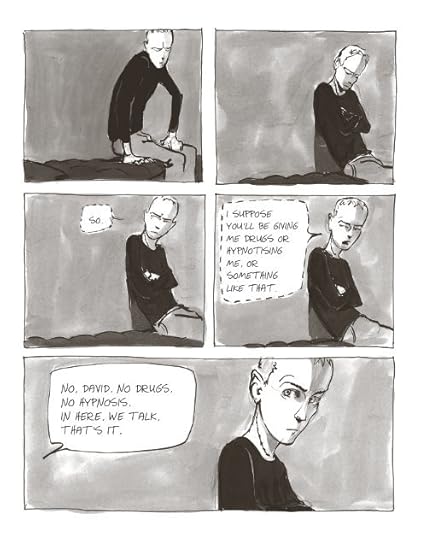 Image #1
Image #1  My Thoughts
My Thoughts
“THE ODD THING ABOUT RECURRING DREAMS IS THAT, NO MATTER HOW MANY TIMES YOU DREAM THE SAME THING, IT ALWAYS TAKES YOU BY SURPRISE.”
DAVID SMALL, STITCHES
“Graphic Novels. They Aren’t Books. They have no literary value.”
Sigh.
I have often heard this. Repeatedly. Books like Stitches are the reason that the argument against graphic novels not being literature heavyweights is so brainless. This story is poignant, as well as painful and oh so very real.
David Small is a famous children’s illustrator who took his childhood memories held them, squeezed them, and wrapped them up into a ball and served us this novel. His childhood was not a happy one; “Dad was never there except occasionally for one of mother’s dry, burned little meals; mother coiled tight inside her shell of angry, resentful silence; my brother in his, and I in mine.”
This is a story full of angry moments. At the beginning usually from his mother, later into David’s adolescence, the anger belonged to him. It was full of lying and cruelty on the part of his parents. Often when reading this, I had to put the book down and take a moment to appreciate my own family, my own parents, and myself as a parent. I am doing better than I think I am.
Most of the story centers on a lie David’s parents told him regarding his health and the casualty cruelties accompanying it. What was supposed to be an easy cyst removal in his neck was actually cancer and left David disfigured and mostly mute. His parents never acknowledge what had happened to him until much later. This leaves him with both physical scars, “A crusted black track of stitches; my smooth young throat slashed and laced back up like a bloody boot,” and understandably the mental scars that would come with that.
I am sure at this point you are wondering why someone would read something like this. It sounds like a long story of pain, and it is. However, David’s story is also one of hope and overcoming your past. It is beautiful and tragic and heartbreaking. But this is a story that will dig into your mind and stay with you. There is a reason it is considered one of the best graphic memoirs ever written. Stitches is a collection of profound moments, and by the end of the story, we understand that even in the worst of circumstances one can find their own voice, and be who they want to be even if they are mute.
Check Out My Other ReviewsReview – Battle Ground by Jim Butcher (Dresden Files #17)
Review – The Ikessar Falcon by K.S Villoso
If You Liked This - Please Share the Love Beth Tabler
Elizabeth Tabler runs Beforewegoblog and is constantly immersed in fantasy stories. She was at one time an architect but divides her time now between her family in Portland, Oregon, and as many book worlds as she can get her hands on. She is also a huge fan of Self Published fantasy and is on Team Qwillery as a judge for SPFBO5. You will find her with a coffee in one hand and her iPad in the other. Find her on: Goodreads / Instagram / Pinterest / Twitter
#MusicMonday – Finally Moving by Pretty Lights
 #musicmonday Music That Speaks to Me
#musicmonday Music That Speaks to Me Sometimes a song, is more than a song.
Finally moving by pretty lights Lyrics I get a good feeling, yeahOh, sometimes I get a good feeling, yeahGet a feeling that I never, never, never, never had before oh, no
I get a good feeling, yeahOh, sometimes I get a good feeling, yeah
Get a feeling that I never, never, never, never had before oh, no
I get a good feeling, yeahJust want to tell ya right now
I really do believe it
Just want to tell ya right now
I really do believe itOh, sometimes I get a good feeling, yeah
Get a feeling that I never, never, never, never had before oh, no
I get a good feeling, yeahJust want to tell ya right now
I really do believe it
Just want to tell ya right now
I really do believe it Check Out Their Album Here Check Out Some Other Great Songs Below
#MusicMonday Ivar;s Revenge by Danheim
#musicmonday Eyes on Fire – Zeds Dead Remix by Blue Foundation



